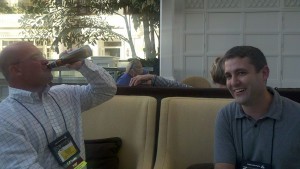Agile CoP Retro
When you think of spending a Saturday afternoon among friends and colleagues, do you picture yourself sitting in front of your computer, collaborating for three hours on a web-based tool and discussing what is working and what could work better? Well, that is exactly what a group of us did. It was time for the quarterly PMI Agile Community of Practice (CoP) retrospective. We couldn't all be in the same physical location so some of us from the community jumped online and tried to make the world (or at least our CoP) a better place. When you look at the graphic above, you may be left scratching your head, if you are neither an Agilist nor a member of the PMI Agile CoP. If you are either, I hope you nod in recognizing the mechanism we used to interact and make our Agile Community of Practice a better place for us all to belong.
Community of Practice
You could describe us as a motley crew of discontents and zealots. You could also describe us as a passionate group of Agilists drawn together, with the hope of helping the PMI community discover the value of Agile practices and approaches. We all hold a sense of belonging to our community. We all believe in the altruistic sharing of knowledge, methods, stories, cases, tools, and documents.
Retrospective
Generically speaking, a retrospective meeting is held at the end of a scheduled event or time interval. With the aid of a facilitator (in this case Brian Bozzuto), a team discusses what went well and what could be improved during the next interval or prior to the next scheduled event. The meeting is time-boxed to help ensure it doesn't just turn into an out-of-control complaining session. When properly facilitated, you come out of the meeting with an actionable list for improvement. Though I always recommend doing retrospectives in person, actually having the retrospective takes priority. Do it wherever you can however you can. Successful teams need to take the time to have retrospectives if they have any chance of improving what they do.
PMI Agile CoP Quarterly Retrospective
The leadership of this community recognizes that as our community grows, some things will work and some challenges will need to be overcome (zoom into the graphic to see what we thought). One thing is for certain: with almost 14,000 members, our PMI community has a lot to offer both members and non-members. Every minute of that Saturday afternoon was well spent. I hope this post and the link to the Cacoo graphic provides some transparency into what we've been doing the last three months.
Source: This post was originally written and published by me on the PMI Agile Community of Practice blog




